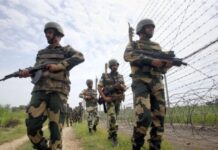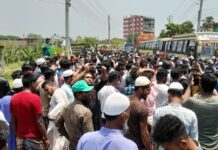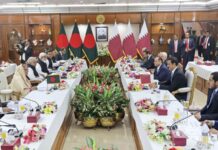
The United States has said the most significant human rights problems in Bangladesh were extrajudicial killings and forced disappearances, some restrictions on online speech and the press, and poor working conditions and labour rights.
While political affiliation was sometimes a factor in the arrest and prosecution of members of the opposition parties, the government did not prosecute individuals solely on political charges, the US said in a new report on Human Rights.
The government took limited measures to investigate and prosecute the cases of security force abuse and killing.
US Secretary of State John Kerry presented the 2014 Country Reports on Human Rights Practices on Thursday at the US Department of State.
The annual Country Reports on Human Rights Practices, commonly known as the Human Rights Reports, cover the status of human rights in countries around the world.
Assistant Secretary of State for Democracy, Human Rights and Labour, Tom Malinowski, delivered additional remarks and took follow-up questions.
The constitution provides for freedom of speech and press, but the government sometimes failed to respect these rights.
But there were some limitations on freedom of speech and some journalists self-censored their criticisms of the government due to fear of harassment and reprisal, said the report.
Bangladesh is a secular, pluralistic parliamentary democracy with a vibrant civil society, it mentioned in the executive summary part.
Prime Minister Sheikh Hasina and the Awami League retained power in the January-5 parliamentary elections, which were preceded by months of political turmoil and violence perpetrated by several political parties, it observed.
After the opposition Bangladesh Nationalist Party (BNP) and its allies boycotted the election and engaged in a series of violent strikes in a dispute over the composition of the government that oversaw the elections, the ruling party won the elections, with more than half of all seats uncontested, the report said.
Most international observers characterised the elections as controversial and falling short of international standards due to the boycott. Authorities failed at times to maintain effective control over security forces.
Other human rights problems included security force torture and other abuse, widespread official corruption, arbitrary arrests and detentions, weak judicial capacity and independence, and lengthy pretrial detentions.
Authorities infringed on citizens’ privacy rights. Politically motivated and intraparty violence remained serious problems, the report added.
Some nongovernmental organisations (NGOs) faced continued legal and informal restrictions on their activities.
Women suffered from unequal treatment. Early and forced marriage remained a problem. Many children were compelled to work, primarily in the informal sector, due either to economic necessity or in some instances trafficking.
Discrimination against persons with disabilities was a problem, especially for children seeking admittance to public school.
Instances of societal violence against religious and ethnic minorities persisted, although many government and civil society leaders claimed these acts had political or economic motivations and should not be attributed wholly to religious beliefs or affiliations.
Discrimination against persons based on their sexual orientation continued.
Weak regard for the rule of law not only enabled individuals, including government officials, to commit human rights violations with impunity but also prevented citizens from claiming their rights, said the report.
Disappearances and kidnappings, some committed by security services, continued. According to Odhikar, from January through September, there were 35 disappearances allegedly involving security personnel, compared with 14 in all of 2013. For the same period, ASK estimated there were 80 disappearances, compared with 53 in all of 2013.
Source: UNB










http://www.qatarchronicle.com/wp-content/uploads/2014/12/141219113433-01-isis-1219-restricted-horizontal-gallery-370×215.jpg
http://www.qatarchronicle.com/wp-content/uploads/2014/12/141219113433-01-isis-1219-restrichttp://www.qatarchronicle.com/wp-content/uploads/2014/12/141219113433-01-isis-1219-restricted-horizontal-gallery-370×215.jpgted-horizontal-gallery-370×215.jpg
New post on The Bangladesh Chronicle
US identifies extrajudicial killings, forced disappearances as BD’s HR problems
by bdchronicle
The United States has said the most significant human rights problems in Bangladesh were extrajudicial killings and forced disappearances, some restrictions on online speech and the press, and poor working conditions and labour rights.
While political affiliation was sometimes a factor in the arrest and prosecution of members of the opposition parties, the government did not prosecute individuals solely on political charges, the US said in a new report on Human Rights.
The government took limited measures to investigate and prosecute the cases of security force abuse and killing.
US Secretary of State John Kerry presented the 2014 Country Reports on Human Rights Practices on Thursday at the US Department of State.
The annual Country Reports on Human Rights Practices, commonly known as the Human Rights Reports, cover the status of human rights in countries around the world.
Assistant Secretary of State for Democracy, Human Rights and Labour, Tom Malinowski, delivered additional remarks and took follow-up questions.
The constitution provides for freedom of speech and press, but the government sometimes failed to respect these rights.
But there were some limitations on freedom of speech and some journalists self-censored their criticisms of the government due to fear of harassment and reprisal, said the report.
Bangladesh is a secular, pluralistic parliamentary democracy with a vibrant civil society, it mentioned in the executive summary part.
Prime Minister Sheikh Hasina and the Awami League retained power in the January-5 parliamentary elections, which were preceded by months of political turmoil and violence perpetrated by several political parties, it observed.
After the opposition Bangladesh Nationalist Party (BNP) and its allies boycotted the election and engaged in a series of violent strikes in a dispute over the composition of the government that oversaw the elections, the ruling party won the elections, with more than half of all seats uncontested, the report said.
Most international observers characterised the elections as controversial and falling short of international standards due to the boycott. Authorities failed at times to maintain effective control over security forces.
Other human rights problems included security force torture and other abuse, widespread official corruption, arbitrary arrests and detentions, weak judicial capacity and independence, and lengthy pretrial detentions.
Authorities infringed on citizens’ privacy rights. Politically motivated and intraparty violence remained serious problems, the report added.
Some nongovernmental organisations (NGOs) faced continued legal and informal restrictions on their activities.
Women suffered from unequal treatment. Early and forced marriage remained a problem. Many children were compelled to work, primarily in the informal sector, due either to economic necessity or in some instances trafficking.
Discrimination against persons with disabilities was a problem, especially for children seeking admittance to public school.
Instances of societal violence against religious and ethnic minorities persisted, although many government and civil society leaders claimed these acts had political or economic motivations and should not be attributed wholly to religious beliefs or affiliations.
Discrimination against persons based on their sexual orientation continued.
Weak regard for the rule of law not only enabled individuals, including government officials, to commit human rights violations with impunity but also prevented citizens from claiming their rights, said the report.
Disappearances and kidnappings, some committed by security services, continued. According to Odhikar, from January through September, there were 35 disappearances allegedly involving security personnel, compared with 14 in all of 2013. For the same period, ASK estimated there were 80 disappearances, compared with 53 in all of 2013.
Source: UNB
bdchronicle | June 25, 2015 at 4:24 pm | Categories: News | URL: http://wp.me/p1RmrW-lgT
Comment See all comments